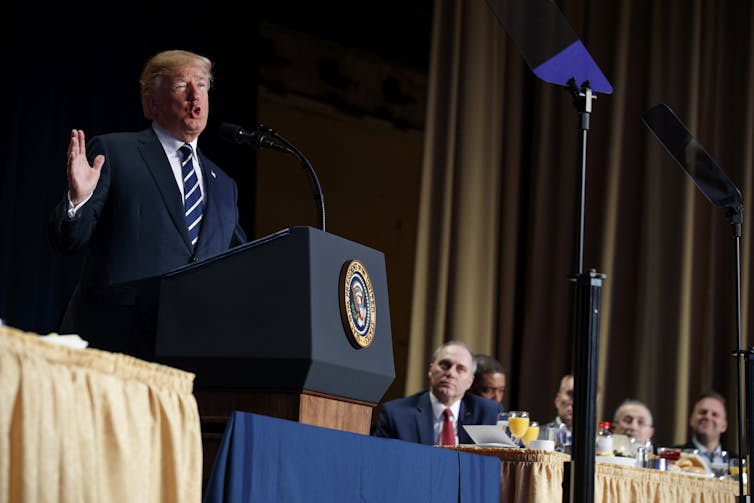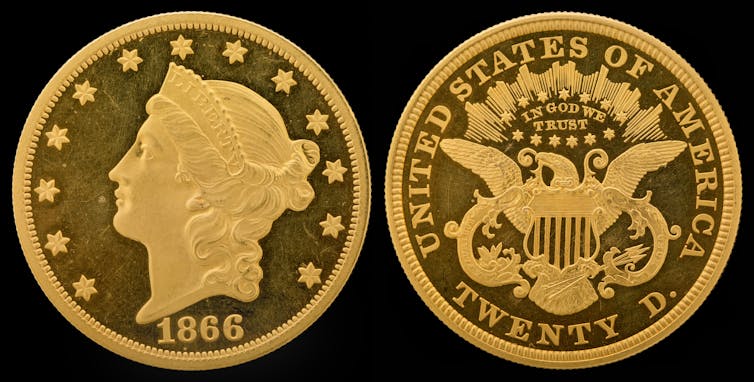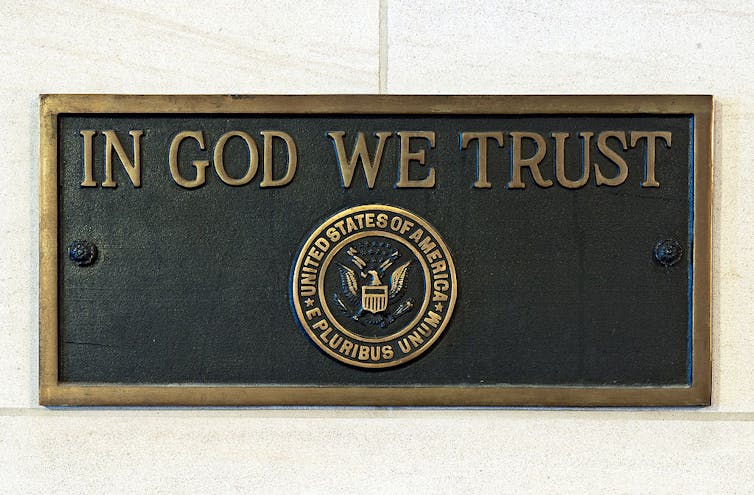Has The Word God Always Been On American Money
In his accost to the National Prayer Breakfast on the morning of Feb. 8, President Donald Trump emphasized the axis of religion in American life. After describing the country as a "nation of believers," Trump reminded his audience that American currency features the phrase "In God We Trust" as does the Pledge of Allegiance. He also alleged that "our rights are non given to us by man" merely "come from our Creator."
These remarks come a week after Trump linked religion with American identity in his first State of the Spousal relationship address. On January. xxx, he similarly invoked "In God We Trust" while proclaiming an "American fashion" in which "faith and family, not authorities and bureaucracy, are the eye of the American life."
Just the history of such language is more complex than Trump'due south assertions advise.

The place of "In God We Trust," and like invocations of God in national life, have been a subject of debate. From my perspective as a religious history scholar they reflect a particular view of the United states, not a universally accepted "American mode."
The Civil War
Political rhetoric linking the United states of america with a divine power emerged on a large scale with the outbreak of the Civil War in 1861. M.R. Watkinson, a Pennsylvania clergyman, encouraged the placement of "In God Nosotros Trust" on coins at the war's outset in order to help the North's cause. Such linguistic communication, Watkinson wrote, would "identify us openly under the divine protection."
Putting the phrase on coins was simply the beginning.
In 1864, with the Ceremonious War still raging, a group supported past the North's major Protestant denominations began advocating change to the preamble of the Constitution. The proposed language – which predictable President Trump'due south remarks about the origin of Americans' rights – would accept alleged that Americans recognized "Almighty God as the source of all authority and power in ceremonious government."
If the amendment's supporters had succeeded in having their style, Christian belief would exist securely embedded in the United states of america authorities.
Merely, such invocations of God in national politics were non to last. Despite lobbying past major Protestant denominations such every bit the Methodists, this then-called Sovereignty of God amendment was never ratified.

Though "In God We Trust" was added to coins, it was not added to the increasingly common paper money. In fact, when coins were redesigned late in the 19th century, it disappeared from coins as well.
As I demonstrate in my volume, these developments were related to the spread of secularism in the post-Civil War U.S. For many people at the time, placing religious language in the Constitution or on symbols of government was not consequent with American ideals.
The revival of 'In God We Trust'
The 1950s, however, witnessed a dramatic resurgence of religious language in government and politics. Information technology was that decade that brought "In God We Trust" into widespread use.
In 1955, President Dwight Eisenhower signed a bill placing the phrase on all American currency. Ane sponsor of that legislation, Congressman Charles Bennett, echoed the sentiments that had inspired the Sovereignty of God subpoena during the Ceremonious War. Bennett proclaimed, that the U.S. "was founded in a spiritual temper and with a firm trust in God."
The adjacent year, "In God Nosotros Trust" was adopted as the first official motto of the U.s..

Both of these developments reflected the desire to emphasize Americans' religious commitment in the early years of the Common cold War. Historians such as Jonathan Herzog take chronicled how leaders ranging from President Eisenhower to the evangelist Billy Graham stressed on the strong faith of the nation in setting the U.South. apart from the godlessness of Soviet communism.
Recently, however, Princeton University historian Kevin Kruse has shown that religious language was non merely rhetoric against communism. "In God We Trust" reflected domestic concerns as well.
The belief in American religiosity that put "In God We Trust" on coins and fabricated it the national motto in the 1950s had emerged over several decades. Conservative businessmen had allied with ministers, including Billy Graham, to combat the social welfare policies and authorities expansion that began with Franklin Roosevelt's New Deal. These wide-ranging programs, designed to tackle the Not bad Depression, irked many conservatives. They objected to regime intervention in concern and Roosevelt's support for labor unions.
As Kruse notes, this alliance of bourgeois business leaders and ministers linked "faith, freedom, and free enterprise."
In this way then, President Trump's repeated assertions of "In God Nosotros Trust" could exist said to reverberate certain American values. Merely, every bit my inquiry shows, for much of U.S. history, the acceptance of such values ebbed and flowed.
"In God We Trust" is a non a motto that reflects universally shared historical values. Rather it represents a particular political, economical and religious perspective – one that is embraced by President Trump and the mod GOP.
This is an updated version of an article originally published on Feb. ii, 2018.
Source: https://theconversation.com/the-complex-history-of-in-god-we-trust-91117
Posted by: reynoldsbuthadou.blogspot.com

0 Response to "Has The Word God Always Been On American Money"
Post a Comment